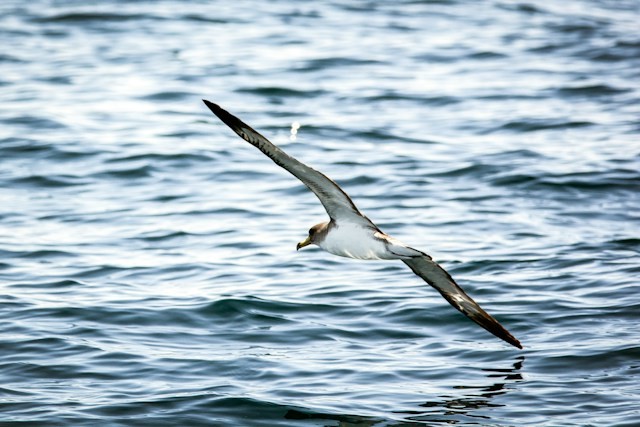The Balearic shearwater, Europe's most endangered seabird, is facing a new challenge: climate change. The environment is warming, and many species are shifting their ranges to adapt.
Individual Behavioral Flexibility

The Balearic shearwater (Puffinus mauretanicus) is a pelagic seabird that spends a significant portion of its life on the open ocean, rarely coming close to land except to breed.
It is slightly larger than the closely related Manx Shearwater, and is brown above and grey/white below.
It flies with rapid, shallow wingbeats on stiffly held wings and can be seen resting on the water or plunge-diving for food.
New research by University of Oxford biologists has revealed that individual behavioral flexibility, not evolutionary selection, is driving the Balearic shearwater's rapid migratory range shift.
The study, published in the journal Proceedings of the National Academy of Sciences, found that individual birds were shifting their range northwards by an average of 25km per year.
The average sea surface temperature in the summering grounds was the strongest indicator of this shift in migratory behavior, indicating that the birds might be monitoring changes in the underlying marine resources.
While there may be unintended consequences to this behavioral adaptation, it is possible that individual animals will be more able to adapt their behavior to the effects of climate change than previously believed. This could have a long-term negative influence on the species.
Conservation Strategies
The findings of the study by University of Oxford biologists could help inform conservation strategies for vulnerable migratory bird species.
The results suggest that individual animals may have greater behavioral flexibility to respond to climate change impacts than previously thought.
However, this behavioral adaptation may have hidden costs, making the long-term impact on this species unclear.
The Balearic shearwater is long-lived but Critically Endangered mainly because of declines driven by fisheries by-catch, as they can get caught on baited longline hooks and gill nets.
Breeding in isolated areas of the Balearic Islands in the Mediterranean, they move in the summer to the Atlantic shores of Spain, France, and increasingly the United Kingdom.
Using tiny on-board geolocation devices, researchers from the Biology Departments of Oxford University and the University of Liverpool, in collaboration with partners based in Ibiza, have been monitoring colonies in Mallorca since 2010.
This demonstrated that after leaving the Mediterranean, the birds have been moving ever-further north.
However, it was unclear if natural selection favoring birds with longer flight ranges or individual birds changing their behavior was responsible for this change.
The researchers examined the travel paths of the same people who had been tagged across a number of years in order to provide an answer. This showed that individual birds moved 25 km northward on average every year.
Understanding Individual Responses
The study by University of Oxford biologists highlights the importance of understanding how individual animals respond to climate change and how this knowledge can inform conservation strategies for vulnerable migratory bird species.
The results suggest that individual animals may have greater behavioral flexibility to respond to climate change impacts than previously thought.
However, this behavioral adaptation may have hidden costs, making the long-term impact on this species unclear.
The findings could also have implications for other migratory species, as well as for conservation efforts more broadly.
Also Read: North American Wolverine Receives Threatened Species Status Due to Climate Change Impacts
© 2024 NatureWorldNews.com All rights reserved. Do not reproduce without permission.

![Tsunami Hazard Zones: New US Map Shows Places at Risk of Flooding and Tsunamis Amid Rising Sea Levels [NOAA]](https://1471793142.rsc.cdn77.org/data/thumbs/full/70325/280/157/50/40/tsunami-hazard-zones-new-us-map-shows-places-at-risk-of-flooding-and-tsunamis-amid-rising-sea-levels-noaa.jpg)



